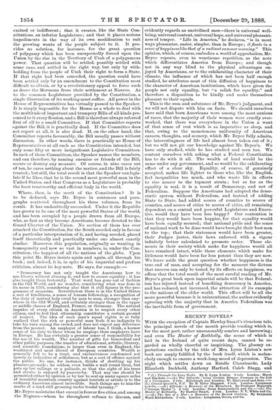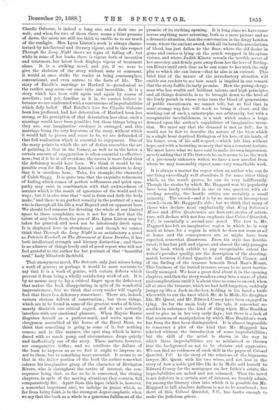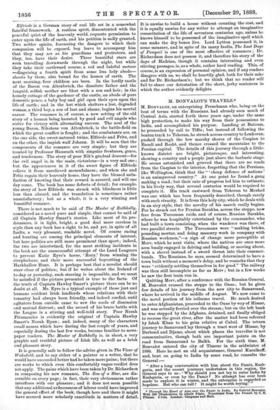RECENT NOVELS.*
WITH the exception of Captain Hawley Smart's vivacious tale, the principal novels of the month provide reading which is, for the most part, rather unseasonably sombre and harrowing; and even The Master of Rathkelly, the scene of which is laid in the Ireland of quite recent days, cannot be re- garded as wholly cheerful or inspiriting. The gloomy ex- pectations excited by the title of Mrs. Lynn Linton's new book are amply fulfilled by the book itself, which is melan- choly enough to ensure a week-long mood of depression. The night which settles down on Estelle Clanricarde, Lady Elizabeth Inchbold, Anthony Harford, Caleb Stagg, and • (1.) Through the Long Night. By E. Lynn Linton. 3 vols. London: Hurst and Blackett.—(2.) The Outcasts: being Certain Strange Passages in the Life of a Clergyman. 2 vols. Edinburgh and London: W. Blackwood and Sons.— (3.) Colonel Quaritch, V.C. By H Rider Haggard. 3 vols. London: Longman!' and Co.—(4 ) EVriede : a Romance of the .Rhineland. By Professor Hausrath (" George Taylor "). 2 vole London : Swan Sonnenschein and Co.—(S.) The Master of Eathkelly. By Hawley Smart. 2 vols. London: F. V. White and Co. —(64 The Son of a Star a Romance of the Second Century. By Benjamin Ward Richardson. 3 vols. London ; Longmans, Green, and Co.
Charlie Osborne, is indeed a long one, and a dark one as well ; and when for two of them there seems a faint promise of dawn, the mists are still too thick to enable us to see much of the sunlight. Mrs. Lynn Linton's work is always charac- terised by intellectual and literary vigour, and in this respect Through the Long Night shows no signs of falling off; but while in some of her books there is vigour both of invention and treatment, her latest book displays vigour of treatment alone. It is a striking novel, and yet, if we were to give the skeleton of the story without note or comment, it would at once strike the reader as being commonplace, conventional, and even untrue to the facts of life. The story of Estelle's marriage to Harford is—paradoxical as the verdict may seem—at once trite and incredible. It is a story which has been told again and again by scores of novelists ; and yet, familiar as it is, we cannot believe it, because we are confronted with a concurrence of improbabilities which defy belief. Had Estelle's love for Charlie Osborne been less profound, had her detestation of Hanford been less strong, or his perception of that detestation less clear, such a marriage would have been possible; but these things being as they are, our imaginative credence is outraged, and this marriage being the very key-stone of the story, without which it would fall to pieces and cease to be, we are defrauded of that full realisation which is essential to enjoyment. One of the many points in which the art of fiction resembles the art of painting, is that in the former, as well as in the latter, a certain amount of exaggeration is often essential to effective- ness; but if it be at all overdone, the excess is more fatal than the deficiency would have been. We think it would be im- possible even for Mrs. Lynn Linton's ardent admirers to deny that it is overdone here. Take, for example, the character of Caleb Stagg. It is quite true that the exquisite refinement of feeling which comes of perfect selflessness and quick sym- pathy may exist in combination with that awkwardness of manner which is the result of ignorance of the world and its ways ; but it is also true that "soul is form and doth the body make," and there is no perfect veracity in the portrait of a man who is through all his life a real Bayard and an apparent boor. We should feel remorse for devoting the whole of our limited space to these complaints, were it not for the fact that the talent of any book from the pen of Mrs. Lynn Linton may be taken for granted, and need not be laboriously dwelt upon. It is displayed here in abundance ; and though we cannot think that Through the Long Night is as satisfactory a novel as Patricia Kemball, or The Atonement of Learn Dundas, it has both intellectual strength and literary distinction ; and there is no admirer of things lovely and of good report who will not feel grateful to the author for her portrait of that "beautiful soul," Lady Elizabeth Inchbold.
That anonymous novel, The Outcasts, only just misses being a work of genius ; or perhaps it would be more accurate to say that it is a 'work of genius, with certain defects which prevent it from being a wholly satisfactory work of art. It is by no means easy to lay a critical finger upon the deficiency that makes the boOk disappointing in spite of its wonderful impressiveness ; but we think that every reader will vaguely feel that there is a deficiency somewhere. There are, indeed, various obvious defects of construction ; but these things, which are to be found in some of the greatest works of fiction, merely diminish our critical regard, and do not seriously interfere with our emotional pleasure. When Maysie Burns disguises herself as a parlour-maid, and waits upon the clergymen assembled at the house of the Rural Dean, we think that something is going to come of it, but nothing comes ; and in like manner, the opal ring which is intro- duced with so much pomp and circumstance, drops quietly and ineffectively out of the story. These matters, however, are comparative trifles ; and we attribute the failure of the book to impress us as we feel it ought to impress us, not to them, but to something more essential. It seems to us that in the latter portion of the book the author somewhat relaxes his imaginative grasp of the character of Errington Rivers, who is throughout the centre of interest., the con- sequence being that, so far as he is concerned, the closing chapters, in spite of the moving situations they contain, fall comparatively fiat. Apart from this lapse (which is, however, a somewhat important one), we indulge in praise which, so far from being faint, is in the strongest degree emphatic, when we say that the book as a whole is a generous fulfilment of the
promise of its striking opening. It is long since we have come across anything more arresting, both as a mere picture and as a dramatic situation, than the conversation in the dingy London room, where the ancient sword, with all its horrible associations of blood, has just fallen to the floor, where the old dealer in gems and curios is lying on the couch wrapped in his opium visions, and where Judith lllootz reveals the terrible secret of her ancestry, and firmly puts away from her the love of Erring- ton Rivers until such time as he can come to her with the only pleats which she can listen—that he also is an outcast. This brief hint of the nature of the introductory situation will enable our readers to see how much is implied in our remark that the story fulfils its early promise. How the young clergy- man who has wealth and brilliant talents and high principles and all things desirable, is to be brought down to the level of the lowly pariah in whose veins runs the blood of generations of public executioners, we cannot tell; but we feel that in some strange way fate will work to bring it about, and the working out of such a catastrophe, not arbitrarily, but with a. recognisable inevitableness, is a task which makes a large demand upon the author's capabilities of imaginative inven- tion. We must say that the demand is met in full ; for it would not be fair to describe the nature of the blow which in a single hour deprived Errington of his love, of his lands, of his home, even of his self-respect,—which left him without hope, and with a haunting memory that was a constant torture. We must leave what we have said to make its own impression, merely adding that if The Outcasts be, as it seems to be, the work of a previously unknown writer, we have a new novelist from whom we may reasonably expect some very remarkable work.
It is always a matter for regret when an author who can do one thing exceedingly well abandons it for some other thing which, as the result proves, he can do very indifferently. Though the stories by which Mr. Haggard won his popularity have been lately criticised in one or two quarters with ex- ceeding severity, the hostile critics are certainly a small minority. The crowd—and it is by no means an incompetent crowd—is on Mr. Haggard's side ; but we think that many of those who declare most emphatically that King Solomon's Mines and Allan Quatermain are first-rate stories of adven- ture, will declare with not less emphasis that Colonel Quaritch, V.C., is essentially a. second-rate novel. The fact is, Mr. Haggard has left an imaginative region in which he is very much at home, for a region in which he does not seem at all at home, and the consequences are, as might have been• expected, somewhat disastrous. Even his style has deterio- rated; it has lost pith and vigour, and almost the only passages in the book which exhibit to any recognisable extent the writer's peculiar quality, are the description of the shooting- match between Colonel Quaritch and Edward Cossey, and of the finding of the treasure beneath Dead Man's Mount. This business of the buried treasure seems to us most inartis- tically managed. We hear a great deal about it in the opening chapters, and then the story wanders away into a maze of plots and complications until it is about time to come to an end, when all at once the treasure, which we had half-forgotten, suddenly jumps up like a Jack-in-the-box, holding in his hand a knife wherewith to cut the knot which Mr. de la Molle, his daughter Ida, Mr. Quest, and Mr. Edward Cossey have been engaged in tying. As for the main body of the tale, it somewhat re- sembles in substance the kind of thing which Miss Braddon used to give us in her very early days ; but there is a lack of that neatness of manipulation by which Miss Braddon's work has from the first been distinguished. It is almost impossible to construct a plot of the kind that Mr. Haggard has selected without the introduction of some improbabilities ; but the skill of the artist is shown in the way in which these improbabilities are so minimised or thrown into the background as not to be obvious and aggressive. We can find no evidences of such skill in the pages of Colonel Quaritch, V.C. In the story of the relations of the bigamous lawyer, Mr. Quest, with his two wives, and not less in the story of how a noble girl like Ida de is Molle sold herself to Edward Coney for the mortgages on her father's estate, the improbabilities are naked and not ashamed. That the novel is not deficient in a certain sort of interest, we frankly admit, for among the literary vices into which it is possible for Mr. Haggard to fall, absolute dullness is not to be numbered ; but short of this, Colonel Quaritch, V.C., has faults enough to make the judicious grieve. Elfriede is a German story of real life set in a somewhat fanciful framework. A restless spirit, discontented with the peaceful quiet of the heavenly world, requests permission to enter upon the life of earth, and his petition is sadly granted. Two nobler spirits, foreseeing the dangers to which their companion will be exposed, beg leave to accompany him that they may act as his guardians and protectors, and they, too, have their desire. Three beautiful stars are seen travelling downwards through the night, but while they take their earthward course, a red and baleful meteor —disguising a fourth spirit from some less holy abode— shoots by them, also bound for the homes of earth. The next morning, four children are born. In the lordly castle of the Baron von Altenbrack, the dissolute father and the languid, selfish mother are blest with a son and heir; in the homely cottage of the gardener of the castle, an abode of pure domestic peace, a baby boy and girl open their eyes upon the. life of earth ; and in the hut which shelters a lost, degraded woman, a third boy, a son of lust and shame, begins his mortal career. The romance is, of course, a new setting of the old story of a human being haunted by good and evil angels who strive for victory with alternating success. The soul of the young Baron, Nikolaus von Altenbriick, is the battle-field on which the great conflict is fought; and the combatants are, on the one side, the sweet-natured twins, Elfriede and Fritz, and on the other, the impish waif Johann. It will be seen that the components of the romance are very simple; but they are treated by Professor Hausrath with singular freshness, grace, and tenderness. The story of poor Nik's gradual descent—for the evil angel is, in the main, victorious—is a very sad one; but the appearances in it of the sweet figure of Elfriede relieve it from unrelieved mournfulness ; and when she and Fritz regain their heavenly home, they have the blessed satis- faction of knowing that their reward is assured, and will one day come. The book has some defects of detail; for example, the story of how Elfriede was struck with blindness is little less than absurd, and the translation is sometimes rather unsatisfactory; but as a whole, it is a very winning and beautiful romance.
There is not much to be said of The Master of .Rathkelly, considered as a novel pure and simple, that cannot be said of all Captain Hawley Smart's stories. Like most of its pre- decessors, it is light, bright, a good deal more careless in style than any book has a right to be, and yet, in spite of all faults, a very pleasant, readable novel. Of course racing and hunting are among the principal elements of interest, but here politics are still more prominent than sport; indeed, the two are intertwined, for the most striking incidents in the book are the unsuccessful attempt of the Land Leaguers to prevent Katie Eyre's horse, Rory,' from winning the steeplechase, and their more successful boycotting of the Harkhallow Hunt. It is perhaps best that a novelist should steer clear of politics; but if he writes about the Ireland of to-day or yesterday, such steering is impossible, and we must be satisfied if the picture presented is true to the facts. Of the truth of Captain Hawley Smart's picture there can be no doubt at all. Mr. Eyre is a typical example of those just and humane resident Irish landlords whose relations with their tenantry had always been friendly, and indeed cordial, until agitators from outside came to sow the seeds of dissension and mutual distrust; and the record of his brave battle with the League is a stirring and well-told story. Poor Norah Fitzmaurice is evidently the original of Captain Hawley Smart's Norah Ryan ; and, indeed, many of the characters recall names which have during the last couple of years, and especially during the last few weeks, become familiar to news- paper readers. The Master of Rathkelly is, in short, a very graphic and truthful picture of Irish life, as well as a brisk and pleasant story.
It is generally safe to follow the advice given in The Vicar of Wakefteld, and to say either of a painter or a writer, that he would have succeeded better had he taken more pains; but there are works to which even this comfortably vague verdict does not apply. The pains which have been taken by Dr. Richardson in composing his new romance, The Son of a Star, are dis- cernible on every page; in fact, their very obviousness rather interferes with our pleasure; and it does not seem possible that any additional arduousness of labour could have improved the general effect of the book, though here and there it might have secured more scholarly exactitude in matters of detail. It is unwise to build a house without counting the cost, and it is equally unwise for any writer to attempt an imaginative resuscitation of the life of seventeen centuries ago, unless he knows himself to be possessed of the imaginative spell which can make the dry bones live. Lord Lytton possessed it, in some measure, and in spite of its many faults, The Last Days of Pompeii is one of the most effective of romances ; Dr. Richardson does not possess it, and therefore his story of the days of Hadrian, though it contains interesting and even stirring passages, is, as a whole, rather hard reading. This, of course, is an expression of personal opinion, and if any readers disagree with us, we shall be heartily glad, both for their sake and for Dr. Richardson's ; but we think that no reader will fail to share our detestation of the short, jerky sentences in which the author evidently delights.




































 Previous page
Previous page